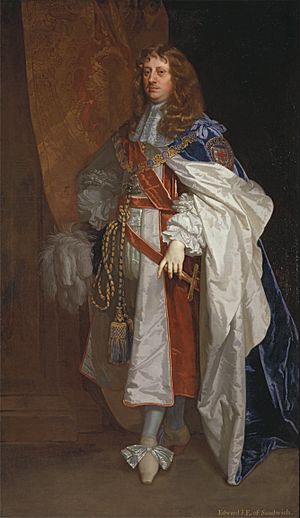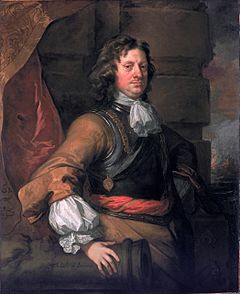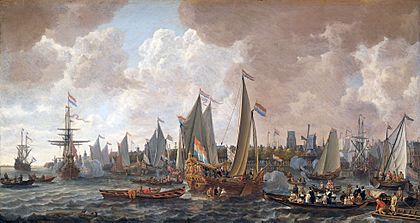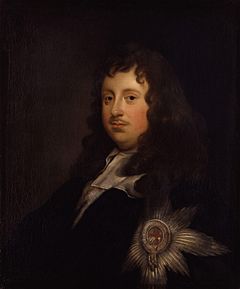Edward Montagu, 1st Earl of Sandwich facts for kids
Quick facts for kids
Edward Montagu, 1st Earl of Sandwich
|
|
|---|---|

Portrait by Peter Lely
|
|
| Ambassador to Spain | |
| In office 1666–1668 |
|
| Ambassador to Portugal | |
| In office 1661–1662 |
|
| Joint Lord Lieutenant of Huntingdonshire | |
| In office September 1660 – May 1672 |
|
| Member of Parliament for Dover |
|
| In office May 1660 – August 1660 |
|
| General at sea | |
| In office 1656–1660 |
|
| English Council of State | |
| In office 1653–1659 |
|
| Member of Parliament for Huntingdonshire |
|
| In office October 1645 – December 1657 |
|
| Personal details | |
| Born | 27 July 1625 Barnwell, Northamptonshire, England |
| Died | 28 May 1672 (aged 46) Sole Bay, Suffolk, England |
| Resting place | Westminster Abbey |
| Spouse |
Jemimah Crew
(m. 1642) |
| Children | 10, including Edward, Sidney, and John |
| Parents | Sir Sidney Montagu Paulina Pepys |
| Residence | Hinchingbrooke House |
| Occupation | Army and naval officer, diplomat |
| Military service | |
| Rank | Colonel and Admiral |
| Battles/wars | Wars of the Three Kingdoms Marston Moor; Siege of York; Second Newbury; Battle of Naseby; Bristol; Anglo-Spanish War (1654–1660) Dunkirk; Second Anglo-Dutch War Lowestoft; Vågen; Third Anglo-Dutch War Battle of Solebay † |
Edward Montagu, 1st Earl of Sandwich (born 27 July 1625, died 28 May 1672) was an important English leader. He was a soldier, a politician, and a diplomat. Edward Montagu fought for the Parliamentarian army during the First English Civil War. He also served as a MP several times between 1645 and 1660.
He was a strong supporter of Oliver Cromwell, who led England during this time. Montagu was part of the English Council of State from 1653 to 1659. He was also a top naval commander, called a General at sea, from 1656 to 1660. After Cromwell died in 1658, Montagu changed his support. He helped bring King Charles II back to the throne in May 1660. This event is known as the Restoration.
In July 1660, he was given the title of Earl of Sandwich. He worked as an ambassador for England in Portugal from 1661 to 1662. Later, he was ambassador to Spain from 1666 to 1668. During this time, he helped create the 1667 Treaty of Madrid. He also led a naval group in the Second Anglo-Dutch War (1665-1667). He died in battle during the Third Anglo-Dutch War at the Battle of Solebay in June 1672.
Edward Montagu is well-known because he appears often in the diaries of Samuel Pepys. Pepys was a distant cousin and a naval official.
Contents
Who Was Edward Montagu?
Edward Montagu was born on 25 July 1625. He was the only son of Sir Sidney Montagu and Paulina Pepys. Paulina was the great-aunt of the famous diarist, Samuel Pepys.
In 1642, Edward Montagu married Jemima Crew. She was the daughter of John Crew, 1st Baron Crew. Samuel Pepys wrote about her with great kindness in his diary. Edward and Jemima had ten children together. Their children included Jemima, Edward, Paulina, Sidney, Oliver, John, Charles, Anne, and Catherine.
Early Military Career and Politics

Even though his father supported the King, Edward Montagu joined the Parliamentary side when the First English Civil War began in 1642. He served under his cousin, the Earl of Manchester. Montagu formed his own group of soldiers. They fought in important battles like Marston Moor and Second Newbury in 1644.
Montagu supported changes in Parliament that led to the creation of the New Model Army in 1645. This new army was very effective. He also became an MP for Huntingdonshire in October 1645. He left the army as required by a new rule.
After a period away from politics, Montagu returned in 1653. His neighbor, Oliver Cromwell, helped him become an MP again. He also joined the English Council of State, a powerful government group. He stayed in this role until 1659.
During the Anglo-Spanish War (1654–1660), Montagu became a joint General at Sea. This meant he was a top commander of the navy. He sailed into the Mediterranean Sea. This trip made him believe England needed a naval base there. This idea came true when England gained English Tangier in 1661.
In 1658, he led the naval group that blocked Dunkirk. When Oliver Cromwell died in September 1658, Montagu remained loyal to Cromwell's son, Richard Cromwell. However, Richard's rule was short and difficult. Montagu was later suspected of talking secretly with the exiled King Charles II. He was removed from his command, but no proof was found against him.
Bringing Back the King
By late 1659, England was in chaos. People wanted new elections and an end to military rule. In February 1660, George Monck, a military leader, marched into London. He supported the Parliament. Montagu took command of the navy again. He was also elected as an MP for Dover.
This put him in a very strong position. When Parliament decided to make Charles king again, Montagu commanded the fleet. This fleet brought King Charles II from the Dutch Republic back to England on 24 May 1660.
Two months later, on 12 July 1660, King Charles II gave Montagu important titles. He became Baron Montagu of St Neots, Viscount Hinchingbrooke, and Earl of Sandwich. The King also made him a Knight of the Garter. He was appointed Admiral of the English Channel and the southern North Sea. He also served as Lieutenant Admiral to the King's brother, The Duke of York.
Edward Montagu was appointed Ambassador to Portugal in 1661. He strongly supported the marriage between King Charles II and Catherine of Braganza, a Portuguese princess. This marriage brought Mumbai and Tangier under English control. Sandwich believed Tangier could become a major trading center. He led the fleet that took control of Tangier in January 1662. He then escorted the new Queen, Catherine, from Lisbon to England.
Ambassador to Spain
During a break from naval battles, Sandwich served as England's ambassador to Spain. This showed that King Charles II still trusted him. As ambassador, his biggest success was the Anglo-Spanish Commercial Treaty of 1667. This agreement helped trade between England and Spain for over a hundred years.
He also helped Spain and Portugal make peace. This led to the Treaty of Lisbon. Being an ambassador was very expensive. When he returned to England in 1668, he had to borrow money from his cousin, Samuel Pepys. On his way back, he visited Tangier again to check on the English forces there.
In 1670, he helped the King's sister, Henrietta of England, travel from France to England. She was there to discuss a secret agreement between her brother and King Louis XIV of France. Sandwich, like most people, did not know about the secret parts of this agreement. In the same year, he became the head of a special committee. This committee advised the King on foreign trade and colonies.
Final Battle and Death
Edward Montagu was called back to lead a naval command. By 1672, at the start of the Third Anglo-Dutch War, he was a Vice-Admiral. His main ship was the Royal James. At the Battle of Solebay on 28 May, his ship was attacked by enemy fire ships. These were ships filled with flammable materials, set on fire, and sent to crash into enemy vessels.
The Royal James was destroyed, and many lives were lost, including Sandwich himself. His body was found a week later. It was only recognized by his clothes. He appeared to have drowned. It is said that Sandwich did not want this war and may have expected his own death. He told his friend John Evelyn before sailing, "he would see him no more."
On 3 July 1672, he was buried in Westminster Abbey. His funeral was a grand event. It started with a procession of five decorated boats along the River Thames.
Sandwich and Samuel Pepys
Edward Montagu was a cousin to Samuel Pepys through his mother's side. Pepys started his career working for Sandwich. He got important jobs in the government because of Sandwich's help. Pepys' famous diary gives us many details about Sandwich's life in the 1660s.
They had a serious disagreement in 1663. Pepys was worried about Sandwich's reputation and how it might affect his official duties. He also cared deeply for Sandwich's wife. After a short time apart, they became friends again. However, they were probably not as close as before. It took a lot of courage for Pepys to bring up such a sensitive topic, especially since he owed so much to Sandwich.
Despite their differences, Pepys always remembered Sandwich with great affection and thanks. He called him "that noble and unparalleled Lord."
 | Janet Taylor Pickett |
 | Synthia Saint James |
 | Howardena Pindell |
 | Faith Ringgold |



